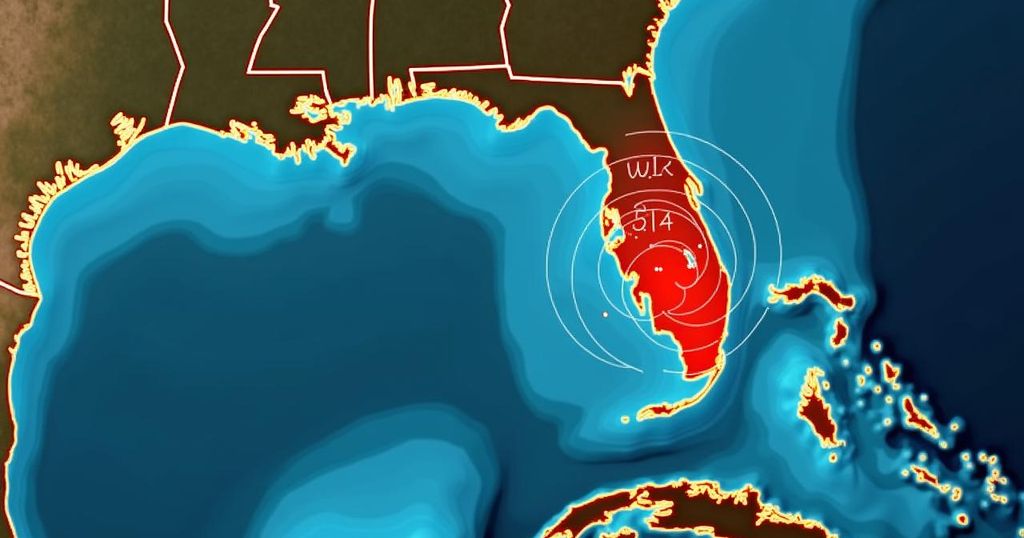Overview of Hurricane Helene’s Impact Across Florida and Georgia
Hurricane Helene made landfall as a Category 4 storm in Florida, causing significant flooding and power outages. Reports confirm at least 22 deaths and over 4.5 million people affected across several states. The hurricane, which brought winds of 140 mph, has since weakened to a tropical storm. Evacuations were ordered in Tennessee due to dam failures, while flooding impacts continue to unfold in North Carolina.
Hurricane Helene made a devastating landfall in Florida’s Big Bend region on Thursday evening as a formidable Category 4 storm, bringing with it catastrophic flooding and widespread power outages affecting millions of residents. Following its incursion into Georgia and up through the Carolinas, the storm has initiated urgent assessments of the damage incurred in Florida while orienting focus toward the north. Reports indicate that at least 22 fatalities have ensued, with power interruption affecting over 4.5 million individuals across six states, inclusive of Tennessee and Virginia. The storm touched down with wind gusts reaching 140 miles per hour approximately 10 miles west of Perry, Florida, at approximately 11:10 p.m. ET on Thursday. This event marks the first time a Category 4 hurricane has struck the Big Bend region of Florida since 1851, as reported by USA TODAY. As Hurricane Helene continued its trajectory inland, it promptly diminished in strength, being designated as a tropical storm with sustained winds of 45 miles per hour by Friday morning at 11 a.m. ET, as per the National Hurricane Center’s reports. At this point, Helene was situated roughly 30 miles southwest of Bryson City, North Carolina, and approximately 105 miles north-northeast of Atlanta. Given the severe impact of Helene, evictions were ordered in Newport, Tennessee at 2:56 p.m. on Friday due to the failure of the Waterview Dam resultant from rising waters. Local authorities in Cocke County have been evacuating residents adjacent to the Pigeon and French Broad Rivers. Furthermore, the onslaught of heavy rains from Helene has prompted flooding concerns in North Carolina, with evacuation orders issued in anticipation of the potential failure of the Lake Lure Dam. Helene is noted to be the 22nd Category 4 hurricane to strike the United States since the year 1920, with the historical record indicating merely four occurrences of Category 5 hurricanes during the same period. The assessment of the monetary damage inflicted by Helene will necessitate time, recalling that prior hurricanes have led to costs in the billions stemming from flood-related destruction, structural damages, and widespread power outages. This narrative will continue to evolve as new information emerges.
The article focuses on Hurricane Helene, a significant weather event that has had a substantial impact on several states in the southeastern United States, particularly Florida and Georgia. Serving as a Category 4 hurricane, its landfall initiated severe challenges such as widespread flooding, power outages, and evacuation mandates in various regions. The historical context presented in the article highlights the rarity of such powerful storms in certain areas and the associated risk factors. Moreover, it discusses the ongoing struggles related to damage assessment and evacuation protocols following the immediate effects of the storm.
In summary, Hurricane Helene has wrought significant destruction across the southeastern United States, primarily affecting Florida and Georgia, with ramifications extending to additional states. As assessments are underway, the storm has claimed lives, caused extensive flooding, and resulted in widespread power outages. Historical references underscore the rarity of such storms in certain areas, while the inevitability of substantial financial damages looms as the full impact of Helene continues to be evaluated. The situation remains fluid as officials manage the aftermath and prepare for future weather challenges.
Original Source: www.usatoday.com




Post Comment